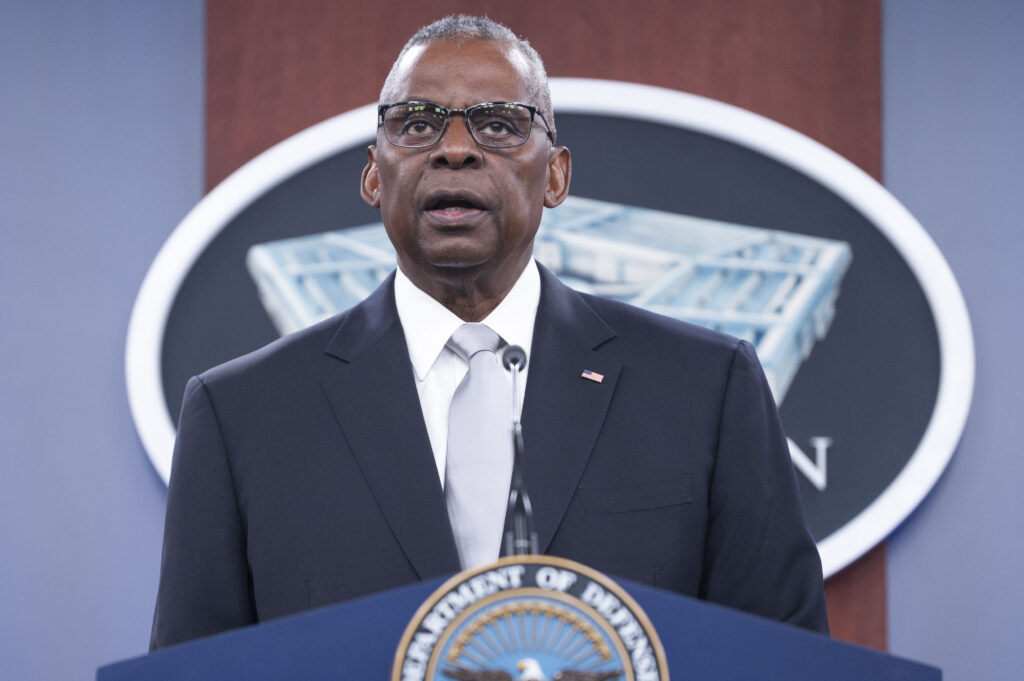Lawmakers from both political parties remain concerned about Secretary of Defense Lloyd Austin’s secretive hospitalization last month.
Pentagon officials briefed Senate Armed Services Committee members in a closed-door meeting on Tuesday, while Austin is set to appear in front of the House Armed Services Committee on Thursday. Tuesday’s SASC briefing came a day after the department released an unclassified summary of the classified 30-day review of his hospital visit.
The review, which was conducted by Jennifer Walsh, the Pentagon’s director of administration and management, found that Austin did not act with “ill intent or an attempt to obfuscate.”
“This briefing is a classic example of a lack of accountability,” Sen. Kevin Cramer (R-ND) told Politico. “They sent a pretty low-level bureaucrat who did a 30-day process evaluation — interviewed a few people, came out with a secret report that doesn’t have a single secret in it, and they’re trying to run interference or obfuscate.”

Austin was diagnosed with prostate cancer in early December 2023 and had surgical treatment on Dec. 22. He was then transported by ambulance back to Walter Reed National Military Medical Center with severe complications from the initial procedure on Jan. 1. The next day, he was put in the intensive care unit.
A handful of Pentagon officials knew of Austin’s hospitalization but did not immediately notify the White House or Congress.
The White House was not informed of his hospitalization until Jan. 4, while Congress and the public were not notified until Jan. 5, even though Austin transferred his authorities to Deputy Secretary of Defense Kathleen Hicks on Jan. 2, who wasn’t informed Austin had been hospitalized until Jan. 4.
“First of all, medial privacy laws, to include HIPAA, prevented medical providers from sharing candid information with the secretary’s staff about his condition,” Maj. Gen. Patrick Ryder said on Monday. “Second, for privacy reasons, his staff were hesitant to prior share information that they did learn. And third, the secretary’s medial situation was in a state of flux. And so, for example, you know, it wasn’t clear in the beginning if this was going to be a one-day visit, a two-day visit.”
Austin agreed to implement all eight of the recommendations from the report.
“I don’t think there was anything untoward. My view is to never attribute to malice what can adequately be explained by incompetence,” Sen. Jeanne Shaheen (D-NH) told the outlet. Sen. Richard Blumenthal (D-CT) added, “I have very strong, severe questions remaining for the Pentagon as to how this seeming concealment was handled, and I think there ought to be some public accountability.”
CLICK HERE TO READ MORE FROM THE WASHINGTON EXAMINER
The Pentagon’s inspector general is also investigating the details regarding Austin’s hospitalization.
“Unsurprisingly, the review of Sec Austin’s actions, conducted by his own subordinates & subject to his approval, HELD NO ONE ACCOUNTABLE,” Rep. Mike Rogers (R-AL), the chairman of the HASC, said. “This is why we are conducting our own investigation. We will seek answers at our hearing w/ Sec Austin on Thursday.”
Austin was hospitalized again on Feb. 11 and notified Congress, the White House, and the public about it the same day, demonstrating the improved notification process put in place by the Pentagon and the White House following his initial trip to Walter Reed.
